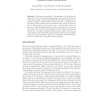Free Online Productivity Tools
i2Speak
i2Symbol
i2OCR
iTex2Img
iWeb2Print
iWeb2Shot
i2Type
iPdf2Split
iPdf2Merge
i2Bopomofo
i2Arabic
i2Style
i2Image
i2PDF
iLatex2Rtf
Sci2ools
90
Voted
CALCO
2005
Springer
2005
Springer
Parametrized Exceptions
Following the paradigm of encapsulation of side effects via monads, the Java execution mechanism has been described by the socalled Java monad, encorporating essentially stateful computation and exceptions, which are heavily used in Java control flow. A technical problem that appears in this model is the fact that the return exception in Java is parametrized by the return value, so that method calls actually move between slightly different monads, depending on the type of the return value. We provide a treatment of this problem in the general framework of exception monads as introduced in earlier work by some of the authors; this framework includes generic partial and total Hoare calculi for abrupt termination. Moreover, we illustrate this framework by means of a verification of a pattern match algorithm.
Related Content
| Added | 26 Jun 2010 |
| Updated | 26 Jun 2010 |
| Type | Conference |
| Year | 2005 |
| Where | CALCO |
| Authors | Dennis Walter, Lutz Schröder, Till Mossakowski |
Comments (0)

